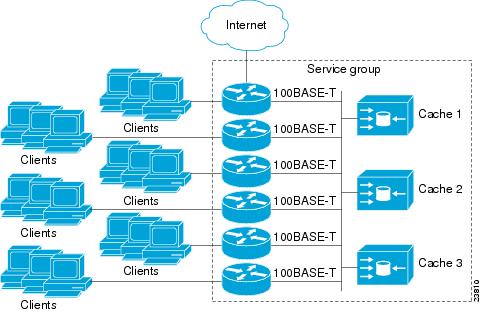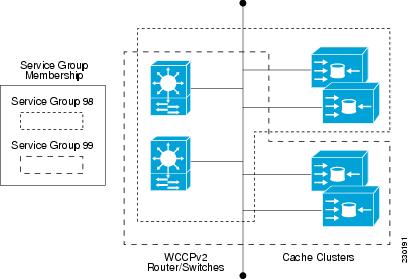In Cisco IOS XE releases that support the WCCP VRF Support feature, the use of GRE redirection results in the creation of
new tunnel interfaces. You can display these tunnel interfaces by entering the show
ip
interface
brief
|
include
tunnel command:
Device# show ip interface brief | include tunnel
Tunnel0 172.16.0.1 YES unset up up
Tunnel1 172.16.0.1 YES unset up up
Tunnel2 172.16.0.1 YES unset up up
Tunnel3 172.16.0.1 YES unset up up
Device#
The tunnel interfaces are automatically created in order to process outgoing GRE-encapsulated traffic for WCCP. The tunnel
interfaces appear when a content engine connects and requests GRE redirection. The tunnel interfaces are not created directly
by WCCP, but are created indirectly via a tunnel application programming interface (API). WCCP does not have direct knowledge
of the tunnel interfaces, but can redirect packets to them, resulting in the appropriate encapsulation being applied to the
packets. After the appropriate encapsulation is applied, the packet is then sent to the content engine.

Note
|
The tunnel interfaces are not used to connect with incoming WCCP GRE return packets.
|
One tunnel is created for each service group that is using GRE redirection. One additional tunnel is created to provide an
IP address that allows the other tunnel group interfaces to be unnumbered but still enabled for IPv4.
You can confirm the connection between the tunnels and WCCP by entering the
show
tunnel
groups
wccp
command:
Device# show tunnel groups wccp
WCCP : service group 0 in "Default", ver v2, assgnmnt: hash-table
intf: Tunnel0, locally sourced
WCCP : service group 317 in "Default", ver v2, assgnmnt: hash-table
intf: Tunnel3, locally sourced
WCCP : service group 318 in "Default", ver v2, assgnmnt: hash-table
intf: Tunnel2, locally sourced
You can display additional information about each tunnel interface by entering the
show
tunnel
interface
interface-number command:
Device# show tunnel interface t0
Tunnel0
Mode:multi-GRE/IP, Destination UNKNOWN, Source 10.1.1.80
Application ID 2: WCCP : service group 0 in "Default", ver v2, assgnmnt: hash-table
Linestate - current up
Internal linestate - current up, evaluated up
Device# show tunnel interface t1
Tunnel1
Mode:multi-GRE/IP, Destination UNKNOWN, Source 172.16.0.1
Application ID 2: unspecified
Linestate - current up
Internal linestate - current up, evaluated up
Device# show tunnel interface t2
Tunnel2
Mode:multi-GRE/IP, Destination UNKNOWN, Source 10.1.1.80
Application ID 2: WCCP : service group 318 in "Default", ver v2, assgnmnt: hash-table
Linestate - current up
Internal linestate - current up, evaluated up
Device# show tunnel interface t3
Tunnel3
Mode:multi-GRE/IP, Destination UNKNOWN, Source 10.1.1.80
Application ID 2: WCCP : service group 317 in "Default", ver v2, assgnmnt: hash-table
Linestate - current up
Internal linestate - current up, evaluated up
Device#
Note that the service group number shown in the examples is the internal tunnel representation of the WCCP service group number.
Group 0 is the web-cache service. To determine the dynamic services, subtract 256 from the displayed service group number
to convert to the WCCP service group number. For interfaces that are used for redirection, the source address shown is the
WCCP router ID.
You can display information about the connected content engines and encapsulation, including software packet counters, by
entering the
show
adjacency [tunnel-interface] [encapsulation] [detail] [internal] command:
Device# show adjacency t0
Protocol Interface Address
IP Tunnel0 10.1.1.82(3)
Device# show adjacency t0 encapsulation
Protocol Interface Address
IP Tunnel0 10.1.1.82(3)
Encap length 28
4500000000000000FF2F7D2B1E010150
1E0101520000883E00000000
Provider: TUNNEL
Protocol header count in macstring: 3
HDR 0: ipv4
dst: static, 10.1.1.82
src: static, 10.1.1.80
prot: static, 47
ttl: static, 255
df: static, cleared
per packet fields: tos ident tl chksm
HDR 1: gre
prot: static, 0x883E
per packet fields: none
HDR 2: wccpv2
dyn: static, cleared
sgID: static, 0
per packet fields: alt altB priB
Device# show adjacency t0 detail
Protocol Interface Address
IP Tunnel0 10.1.1.82(3)
connectionid 1
0 packets, 0 bytes
epoch 0
sourced in sev-epoch 1
Encap length 28
4500000000000000FF2F7D2B1E010150
1E0101520000883E00000000
Tun endpt
Next chain element:
IP adj out of Ethernet0/0, addr 10.1.1.82
Device# show adjacency t0 internal
Protocol Interface Address
IP Tunnel0 10.1.1.82(3)
connectionid 1
0 packets, 0 bytes
epoch 0
sourced in sev-epoch 1
Encap length 28
4500000000000000FF2F7D2B1E010150
1E0101520000883E00000000
Tun endpt
Next chain element:
IP adj out of Ethernet0/0, addr 10.1.1.82
parent oce 0x4BC76A8
frame originated locally (Null0)
L3 mtu 17856
Flags (0x2808C4)
Fixup enabled (0x40000000)
GRE WCCP redirection
HWIDB/IDB pointers 0x55A13E0/0x35F5A80
IP redirect disabled
Switching vector: IPv4 midchain adj oce
IP Tunnel stack to 10.1.1.82 in Default (0x0)
nh tracking enabled: 10.1.1.82/32
IP adj out of Ethernet0/0, addr 10.1.1.82
Adjacency pointer 0x4BC74D8
Next-hop 10.1.1.82
Device#




 Feedback
Feedback